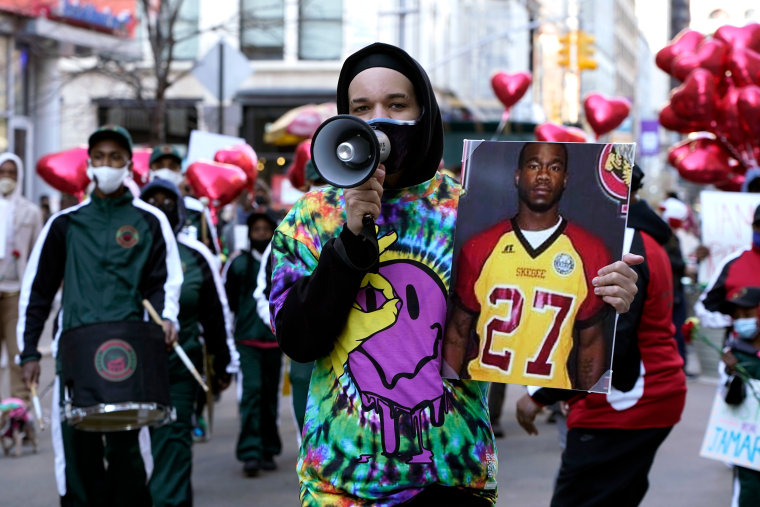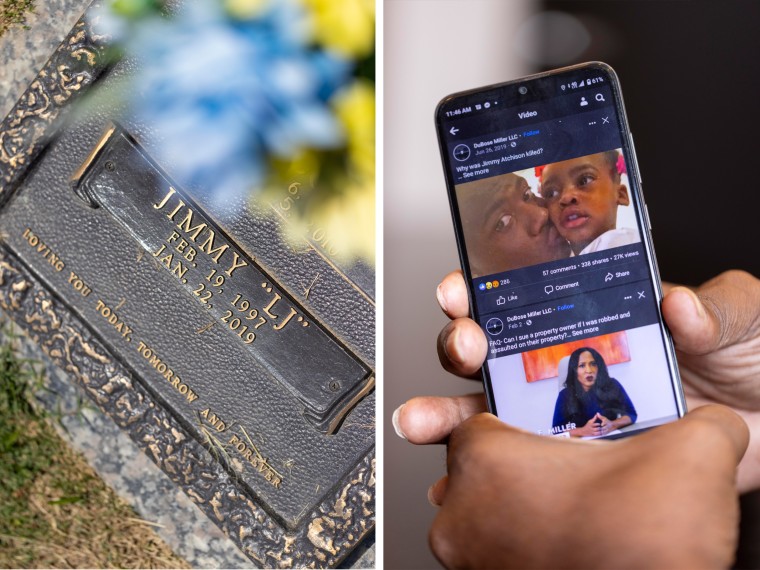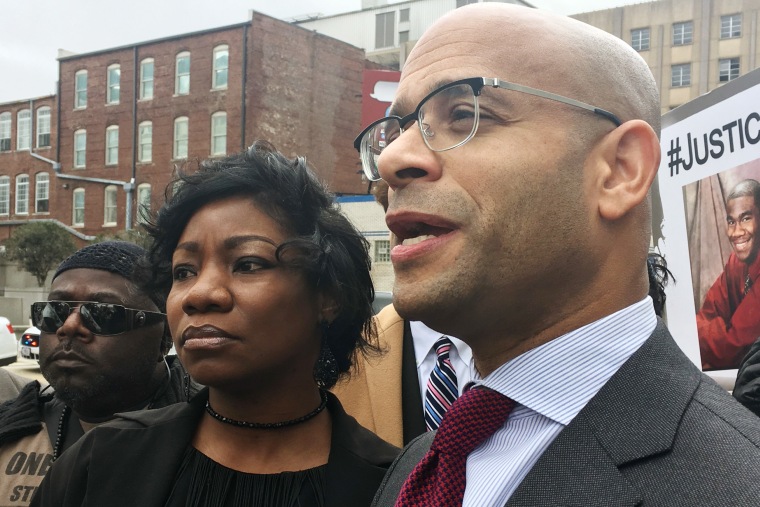In Atlanta, Seleta Griffin, under Willis’ predecessor, led the Public Integrity Unit, which investigated police misconduct. She investigated Atchison’s death and the shooting of Jamarion Robinson.
In the Robinson investigation, which started in 2016, Griffin learned firsthand about the legal hurdles to prosecuting federal task force officers. For starters, when local officers join federal task forces, they are deputized with federal powers and protections. Members of the federal task force shot Robinson nearly 60 times while they were trying to serve a warrant, NBC News reported.
Officers said Robinson, 26, shot at them several times. The family denies that he fired, and his mother said she told law enforcement that Robinson had been diagnosed with schizophrenia.
Griffin learned that getting Justice Department law enforcement agencies and prosecutors to share case files and agency directives, along with granting interviews with federal agents and task force officers, was difficult.
Federal officials follow a 1951 U.S. Supreme Court decision, Touhy v. Ragen, that bars local law enforcement from getting subpoenaed information, testimony and other records about federal officers without permission from the Justice Department. Local prosecutors say the bureaucratic process, known as “Touhy Requests,” often drags on for months, slowing down their probes into potential abuse by federal law enforcement.
“It’s like the state versus the federal government,” Griffin said. The Fulton County DA’s office ultimately sued the Justice Department for access to files about the Robinson shooting. A federal judge ordered the Justice Department to pay the DA’s office more than $114,000 in attorneys’ fees and costs, court records show.

Griffin and other current and former prosecutors argue that their most formidable obstacle after they charge federal officers or task force members with local crimes is a passage of the Constitution that says federal law “shall be the supreme Law of the Land.” The U.S. Supreme Court has interpreted the provision, known as the Supremacy Clause, over the decades to mean states can’t interfere with the federal government’s police work.
“We can indict all day long,” Griffin said. “Once it’s in federal court, that’s where it gets dismissed. Because they’re saying that they’re immune from prosecution under federal protection.”
The legal argument traces back to the 19th century. During the War of 1812, Congress protected federal customs officers from local interference. Subsequent laws protect other federal officers from being sued or prosecuted on the local level.
In 1889, a deputy with the U.S. Marshals, David Neagle, shot and killed a man who had been harassing a U.S. Supreme Court justice on a train in California. A sheriff arrested Neagle for murder, and the nation’s highest court stepped in and ruled that state officials couldn’t jail Neagle for engaging in acts on behalf of the federal government.
More than 130 years later, federal officers still use the Neagle ruling to argue that local prosecutors can’t pursue criminal charges against federal law enforcement, and usually federal judges agree.
Under current federal law, officers can ask federal judges to transfer their cases from the state level into the federal court system, where, under the Supremacy Clause, federal judges often throw out charges brought by local prosecutors.
That tangle of protections has made it all but impossible to stop federal courts from shielding federal officers from legal repercussions, experts say. And the protections extend to local officers who are formally deputized as members of federal task forces.
The Untouchables: read more of the NBC News federal law enforcement accountability series
- How the Supreme Court has effectively dismantled Bivens claims, lawsuits against federal officials accused of violating constitutional rights.
- How federal law enforcement agencies under the Justice Department shroud their shootings in secrecy.
- How families who lose loved ones in shootings involving federal officers have little recourse in the nation’s courts.
- NBC News documented five years of shootings by officers working for or with the ATF, DEA, FBI and U.S. Marshals. Explore the data.
- How a series of Supreme Court rulings allow federal officials from bureaucrats to corrections officers to violate people’s constitutional rights with impunity.
“Is the fix to have the feds not defend the federal task force? Well, that won’t happen,” said Daniel Richman, a former federal prosecutor who is now a professor at Columbia Law School. “The federal government takes all its equities into account, and those equities include protecting agents from what it thinks might be improper prosecutions.”
When Griffin became the supervisor of the Public Integrity Unit in 2019, Atchison’s death was the first new case to come across her desk. After her unit completed its investigation into the federal task forces that shot both Robinson and Atchison, Covid hit. Her office could no longer convene grand juries, and the indictments stalled.
In 2020, Fani Willis, a former prosecutor in the district attorney’s office and a magistrate judge, unseated a six-term incumbent. Willis, who secured the endorsement of the Atlanta police union, won the election after having campaigned to clear a backlog of police misconduct cases and fight corruption.
After she took office, Willis took over the Robinson and Atchison cases, presented them to grand juries and secured indictments against three officers involved in the shootings. Sung Kim, who shot Atchison, was charged with felony murder and involuntary manslaughter in December 2022.

‘They look after their own’
The issue extends beyond legal precedents. Current and former prosecutors who have tried to prosecute federal officers say they are outmatched by the sheer number of lawyers the Justice Department can muster.
“There were 10 lawyers on their side against just me,” recalled Denise Woodbury, a former Idaho prosecutor who charged an FBI sniper with involuntary manslaughter after he mistakenly shot and killed a suspect’s wife during a standoff in Ruby Ridge in 1992. The case became infamous among far-right militia members.
A federal judge, citing the Supremacy Clause, ruled that the FBI agent was immune from state prosecution. “They look after their own, rather than look for justice,” Woodbury said.
A federal appeals court later ruled that the state could reopen the case, but Woodbury’s successor declined to do so.
In 2014, the district attorney’s office in Austin, Texas, charged an FBI task force officer named Charles Kleinert with manslaughter. Kleinert was at a bank investigating a robbery in 2013 when Larry Jackson approached employees, gave a false identity and asked to withdraw cash.
Kleinert began to question Jackson, who ran away. When he caught up to Jackson, a physical struggle ended with Kleinert shooting Jackson in the neck. Kleinert says he fired his weapon accidentally.
The local district attorney charged Kleinert, an Austin police detective who was a deputized member of a FBI federal task force at the time, with murder. U.S. District Judge Lee Yeakel, citing the Supremacy Clause, dismissed the charges. The district attorney’s office appealed the case up to the Supreme Court, which declined to hear it.
Yeakel, now an attorney in private practice, told NBC News that by declining to take the Kleinert case, the Supreme Court has yet to answer whether Supremacy Clause protections apply to local police officers on federal task forces.
“They could leave Neagle in place but say the protections afforded are for a purely federal officer performing purely federal officer duties,” Yeakel said. “They can restrict the Supremacy Clause immunity.”
More recently, a federal judge stopped prosecutors in Virginia from pursuing a state involuntary manslaughter case in 2021 against two officers with the U.S. Park Police. The officers chased a car whose driver fled a nonfatal hit-and-run. The chase ended with officers shooting and killing the motorist.
Steve Descano, the local prosecutor, said he tried to prosecute the Park Police officers despite warnings from the Justice Department that his effort would prove fruitless.
“The Department of Justice would not allow FBI agents and the investigators in their case to be part of our case,” Descano said. “It was basically a dead letter to us.”
NBC News found that federal prosecutors failed to charge any federal agents or task force officers for shootings that occurred from 2018 to 2022. Local prosecutors, during the same period, charged 79 state and local officers with murder or manslaughter after on-duty shootings, according to Philip Stinson, a criminal justice professor at Bowling Green State University who tracks nonfederal officers charged with crimes.

Former federal prosecutors said state prosecutors handle murder or manslaughter cases, unless there are connections to a federal crime, such as the murder of a federal officer.
“You can’t just say: ‘I hate that this agent assaulted or killed somebody. So I’m going to open a federal case,’” said Joyce Vance, an NBC News legal analyst who was the U.S. attorney for Northern Alabama during the Obama administration. “That’s not how it works.”
‘I am trying to get this global’
Now that former officer Sung Kim’s murder case has been moved to federal court, past decisions suggest it will be dismissed. The murder case Fulton County prosecutors filed against officers who killed Jamarion Robinson is still alive, but similarly endangered.
The case is believed to be the first in which an agent with the U.S. Marshals has been charged for a fatal on-duty shooting. Eric Heinze, an assistant chief inspector and a high-ranking officer with the U.S. Marshals, remains on the job. A federal judge moved the case to federal court, where the judge has yet to rule on whether the officers can be prosecuted.
Monteria Robinson, Jamarion’s mother, remains hopeful the federal judge will let the case go forward.

“The law enforcement officers that killed my son must be convicted, sentenced and sent to prison to serve their time just like any other citizen in this country who commits murder,” she said.
Lance LoRusso, an attorney for Heinze, argued that officers on federal task forces have a constitutional right to have local charges filed against them moved to federal court.
“It’s not any harder to prosecute federal officers. You just have to do it in federal court,” LoRusso said. “It’s a basic concept of federalism.”
Willis said that, after her office indicted members of the U.S. Marshals task force, the federal agency rolled back its fugitive investigations in the Atlanta area. “I think it’s shameful,” Willis said. “I take it as a situation that could make citizens less safe.”
Court filings by Willis’ office say the U.S. Marshals task force didn’t have the authority to arrest Robinson on state crimes. The U.S Marshals consider those legal filings substantiation of an unwillingness to acknowledge their legal authority to execute state warrants, federal officials say. As a result, they say, marshals now fear that local prosecutors will charge them for simply helping local police do their jobs.
Drew Wade, a spokesman for the U.S. Marshals, said the agency’s “fugitive investigations are based on our statutory mission to safely bring offenders to justice under the law.”
In Atchison’s case, Kim’s lawyer argues that he shouldn’t face murder charges because he is protected by both the Supremacy Clause and the state self-defense law. A trial date for Kim hasn’t been set.











